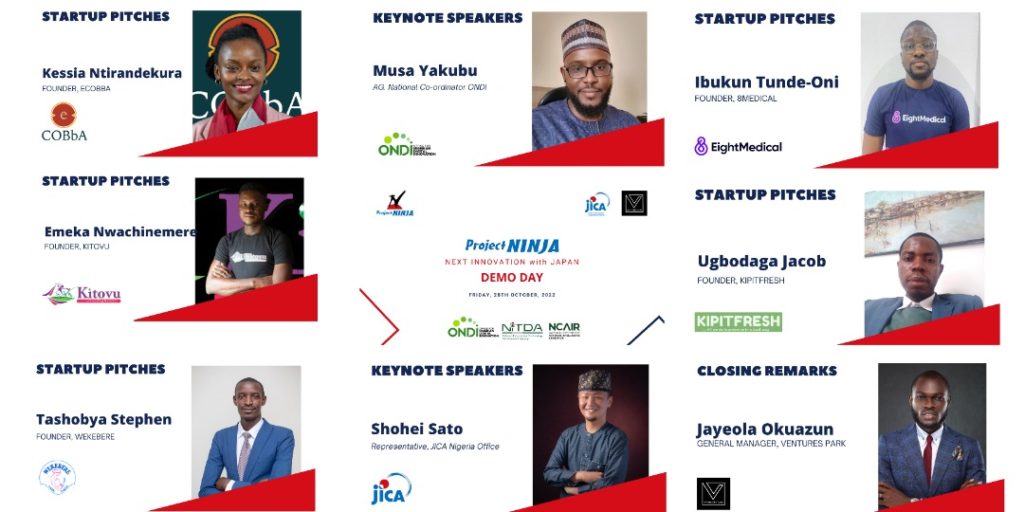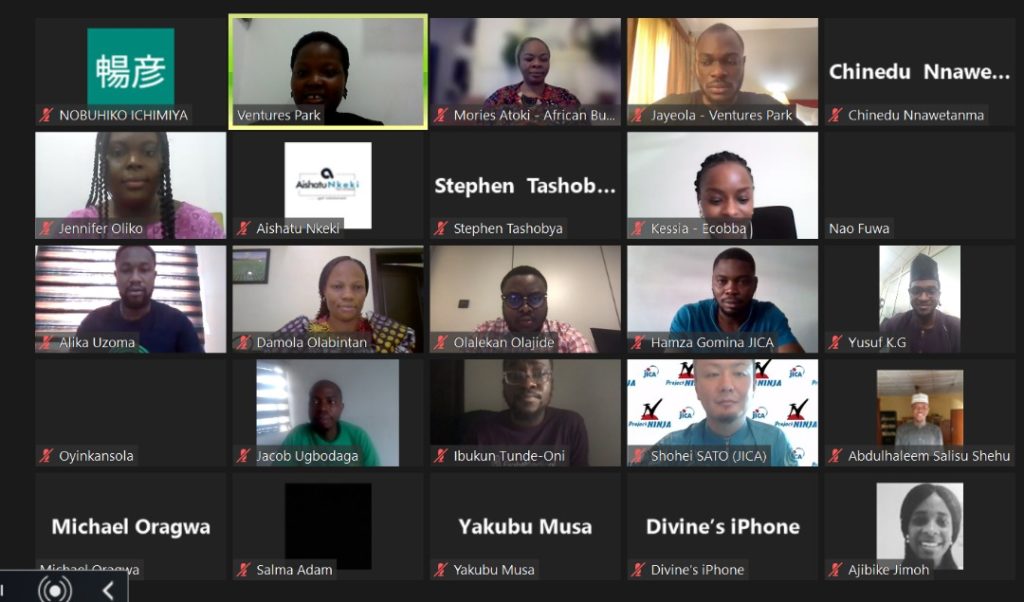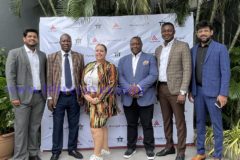
The Japanese Innovation Corporation Agency, JICA, has become a more prominent member and partner in Nigeria’s start-up ecosystem, especially with the impact of the NINJA Accelerator Programme which they have consistently organised over the past 2 years in partnership with the Office for Nigerian Digital Innovation (ONDI), National Information Technology Development Agency (NITDA) and enterprise support organisation – the Ventures Park. This accelerator program, which is a platform for quality African start-up companies to be identified, also serves as a springboard, accelerating the growth and success of such start-ups.
As a part of the activities to mark the end of the 2nd cohort of the Next Innovation with Japan, NINJA Accelerator on the 28th of October 2022, was a Demo Day for the five (5) finalists from the programme to pitch to an audience of angel investors, venture capital firms, and other funding agencies and institutions.
The search for these 5 start-ups began in May of 2022 with a call for applications to early-stage companies within the health-tech, cleantech, and agritech sectors, seeking to enhance the start-up ecosystem in Nigeria. The decision to focus on these 3 sectors was an outcome of a Tech Cabal report which JICA commissioned in 2021. The report revealed that healthtech, cleantech and agritech are some of Nigeria’s most underperforming start-up sub-sectors. In 2021, 76% of funding into Nigerian start-ups went into fintechs, creating a funding gap for the other sub-sectors. At the time the call for applications had closed in June 2022, 1,072 companies from 13 countries including the United Kingdom and Cyprus had applied for the programme. 12.5% of them were healthtech start-ups, 15.1% cleantech, and 72.4% agritech. The five start-ups which made it to the demo day are Ecobba (agritech), Kipitfresh (agritech), Kitovu (cleantech), Wekebere (healthtech), and Eightmedical (healthtech).
The finalists passed through 12-weeks partnerships and training sessions strategically designed and outlined for their growth, beginning with an orientation on the Nigerian start-up ecosystem. After the orientation, a needs assessment was conducted to identify critical growth points for each start-up. Mentors, advisors, and facilitators were assigned to each of the start-ups to develop a customised pattern of development, with accountability for each.
As a part of the successful outcomes of the programme, companies in the cohort have a better understanding of how partnerships can be leveraged to gain access to resources. Emeka Nawchinemere and his team at Kitovu who are cutting down post-harvest losses, enabling smallholder farmers to increase productivity and increase income through their cleantech climate farm and post-harvest infrastructure reports that Kitovu onboarded over 1,000 farmers, more than 100 agents, and opened partnership conversations with executives from two of Nigeria’s biggest banks during the course of the accelerator programme.
Similarly, Kessia Ntirandekura of Ecobba, a Kenya-based start-up that digitises community savings groups and lending groups on-boarded over 90 users, and is now in talks with a digital asset management company. Ecobba began drafting a contract with the Capital Markets Authority (CMA) to provide a sandbox environment for 12 months. The National Bank of Kenya was interested in partnering with them. To prove their learning process, Ecobba is exploring a partnership with Kitovu to onboard some of the farmers in his database.

Kipitfresh founder,Ugbodaga Jacob, recorded the business truck revamp, launched a marketing campaign to onboard product users, and engaged interns to support fieldwork of reducing the rate of post-harvest loss for farmers using cold-chain technology storage. They launched a 5-ton mobile reefer for storing fruits and vegetables.
Tashobya Stephen of Wekebere, a Uganda-based medical start-up designing the future of prenatal care also, officially registered with the Corporate Affairs Commission in Nigeria. launched a digital platform for doctor consultations. Its business is combining connected devices and data analytics to reduce maternal death, empower mothers, and provide doctors with tools and information to predict better and manage pregnancy outcomes.
In the same vein, Eighmedical, the 911 for Africa also participated in the accelerator. Led by Ibukun Tunde-Oni, Eighmedical is providing access to urgent and emergency care by connecting emergency care responders on motorcycles and ambulances to users in distress within 10 minutes or less. During the programme, the start-up leveraged partnerships with event planners across Lagos with over 20,000 events per month. It also raised $230,000 in funds and is currently responding to at least 10 emergency calls per day, primarily from Google searches.
These processes were not without challenges, but at the end of 12 weeks, partnerships and business alliances were formed with these businesses within Nigeria’s start-up ecosystem.
It doesn’t end here, if you’d love to partner or find out more information, kindly send an email to sato.shohei@jica.go.jp or support@theventurespark.com. Let’s build the future of Africa together.



















